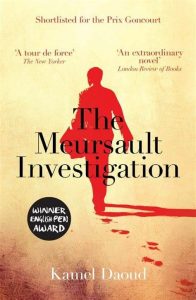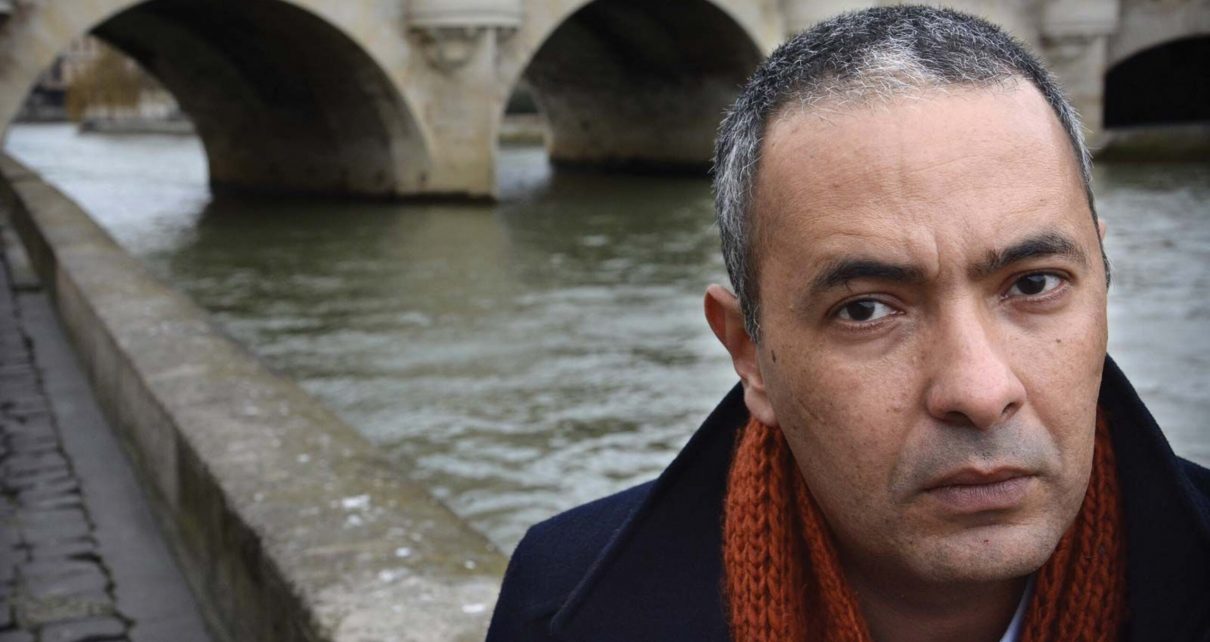Review by Olatoun Gabi-Williams

The Meursault Investigation” is the dark wonderland Kamel Daoud has created as a searing rejoinder to L’Etranger”, probably the most famous of Albert Camus’ novels. If Camus rejected the word “existentialism” to define his novels, Daoud surely does not. Dealing extravagantly in the currency of existentialism, “The Meursault Investigation” must be its great, latter-day exponent and the landscape of the investigation, its marketplace. It’s all here: the godless and irrational universe; existence, not essence; individual free will; and the totality of responsibility we must carry alone. In this bleak framework, autonomy is an inescapable burden, and death is the only escape from the unrelenting struggles that result as each of us tries to make sense of our freedom. This is the philosophical wasteland I outgrew even before I left university. I outgrew it because I wanted to be happy. If you haven’t read Camus’ ‘L’Etranger’ (’The Stranger’, ‘The Outsider’), you will need to have read at least one summary if you are to recognise the genius of ‘The Meursault Investigation’, which reads like a bastard child, pointing the finger of accusation at its mother. Without a good summary, you will be unable to recognise the plethora of referents that Daoud has scattered across the pages of his book to map the way home—to “L’Etranger”.
But the breadcrumb trail does not make for an easy way home: twists await the reader and tricky signposts that question the truth of claims made by Meursault in Camus’ book. At other times, the signposts flatly contradict Meursault, implying that the murderer is a liar. In this rich wilderness, trees of existential life soar and absurd ideas interlock with evocations of the Qur’an to ignite a forest fire of man’s vanities, transforming ‘The Meursault Investigation’ from a clever book into a literary outlier.
The picture the author paints is—I can find no other word—hallucinogenic. Picture a maniacal mother in a city-wide hunt for facts and motives behind her son’s fictional murder. Then picture this haik-clad mother, in the wake of the War of Liberation, conscripting her younger son, now a grown man, to carry out a reprisal killing—not of the murderer (in prison for a different crime)—but on any old “roumi”, any old carryover from colonial Algeria.
Flashback to the “thousand alleys” that make up the city of Algiers. Picture little Haroun, out of breath, catching up as best he can with his intrepid mother. Listen as this mere child begins his own scorching, lifelong interrogation of the facts surrounding his brother’s death—in a book—and the impact of that death on his own life. And finally, look at Haroun today—a barfly while wasting away his old age in the few bars that remain in a city ruled by imams. Listen to him rant to an audience of invisible “friends” and barmen. That Haroun wrests piercing significance at the metaphysical level and at the level of politics and culture from his brother’s throw-away death is not a deficiency of the book: I smiled ironically as I read, knowing too well that the drunk and the deranged can make such good sense.
With its breadcrumb trail and signposts that like to subvert, Haroun’s case for prosecution crackles with acid wit. It is also exhausting, mirroring the incontinence of old age as he looks back to a childhood swallowed up by death and loneliness. As he looks around himself in the present, he sees the old soaks wasting away in one of the only bars still afloat in the city, which people treat like an ‘old harlot’ insulting it, abusing it, and ‘flinging garbage in its face’ as though ‘they (had) a grudge against it’ It is here in Algiers that he lives out his aimless, atheist existence, with only the next open bar for direction and only the bottle to numb the pain.
In this début novel, Kamel Daoud has made a devilish pact with his talent to shine a mind-bending light on the central issue of L’Etranger: a murder of a native committed in cold blood, indifferently, and in broad daylight by a French settler, a “roumi”, a foreigner, an outsider, on a beach in the colonial city of Algiers.
In the scant reportage Camus provides in his book, there is only an ‘Arab’ victim. No name is given and no mention of his corpse, as though Musa’s body were flotsam and jetsam washed away by the sea, not worth mentioning. This nothingness of man, particularly colonised man, is the book’s major thesis.
What Daoud is saying is that if a wanton murder can take place in broad daylight on a stretch of beach in Algiers, it is possible only because the coloniser looked at the colonised and failed to see a person with a name, a family, a culture and a history. As a literary conceit, our narrator’s logic is very clever; as a case for the prosecution, it is unassailable. Listen: “If (the murderer, “The Stranger”) calls my brother ‘the Arab’, it’s so he can kill him the way one kills time, by strolling around aimlessly.”
Corollary to this theme is the principle of interchangeability, which undercuts the foolish binaries we continue to erect for transacting the business of living. In the existentialist paradigm, the murderer and his victim are equally venal and equally blind; one could easily switch places with the other. The mute spectres of today become the powerful spectators of tomorrow. And if it is true that the ferocity of the War of Liberation followed in 1962 by Independence, drove out the pieds-noirs, the French colonisers, it is also true that on their heels, what followed was not the nationwide joy of freedom but escalating poverty and political instability, which increased with the upsurge of Islamic fundamentalism. One form of oppression supplants another in a vindication of the existentialist perspective on the world’s condition: ‘The more things change, the more they stay the same.’
From the minarets, the muezzin calls the faithful of Algeria to prayer. In ‘The Meursault Investigation’, Kamel Daoud responds with a dirge created to dismantle Islam’s sacred doctrines. Inspiring in its artistic beauty, the deconstruction disturbs with its oscillation between scientific coldness and the inflamed vitriol of a wounded heart. In Daoud’s testament, death engulfs life. In his testament, no exodus is planned to carry people out of slavery and into a Promised Land. There is no Moses here, only Musa, who is dead; no hero called to part the seas with his ‘magic staff’; no rod of authority. Kamel Daoud will say no Amen to that story.
What he offers is what Camus offers the reader: a cursory report about a murdered Arab whose name is not known until he, Kamel Daoud, writes his own book in order to identify the Arab, and name him, decades after Musa’s missing body, like so much debris might have been washed away by the sea.
As an act of subversion and iconoclasm, ‘The Meursault Investigation’ has no rivals. But Daoud’s dirge is not for me. Only once throughout Haroun’s interrogation did the eyes of our hearts meet. It happened on page 49: ‘Night has fallen’ over the city. Before the vision of a million lights, Haroun’s being filled with a love so consuming that it becomes a prayer that an ‘immense’ and ‘infinite’ force of love should behold Oran’s nighttime beauty and redeem its squalor by day.
The books of the New Testament, particularly the Pauline letters, call us to look within ourselves to ‘the love the Holy Spirit sheds abroad in our hearts’. The force of love that Haroun experiences on page 49 is the birthplace of the societal model, which, like a spectral city, he intuits. This turning away from man-made answers to our problems towards the Love and Wisdom of God speaking inside our hearts is called repentance. Guided by the epistles of St. Paul, if we persevere, we are assured that our perceptions will sharpen, and we will be rewarded with a roadmap through the wilderness of our labours to the city the Lord is building. This city is the Christian’s inheritance, and repentance is the key that unlocks its gates.
Yes, the Christian’s quest is mysterious—as full of mystery as Daoud’s interrogation of the world around him is full of the absurd. And yes, Daoud is correct—more correct than he would believe: we are all Musa. Given the divinity of our source, this is cause not for regret but for joyful celebration. Each of us is Moses; each one of us the prophet we’ve been waiting for who carries in his heart love for the brethren, the blueprint of God’s kingdom, and who, with this authority, will lead us through the Red Sea of our struggles into our Promised Land.
- Reviewer: Olatoun Gabi-Williams
The Meursault Investigation
Author: Kamel Daoud
Winner of the English Pen Award
Winner, Prix Cioncourt for a first Novel
Winner of the Prix des cinq Cintinents
Winner , Prix Francoiss Mauriace
Publisher : Other Press; 1st edition (June 2, 2015)
Language : English
Paperback : 160 pages
ISBN-10 : 1590517512
ISBN-13 : 978-1590517512
Available at Amazon


